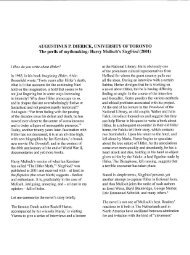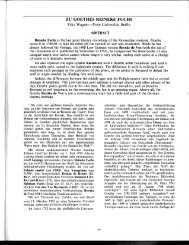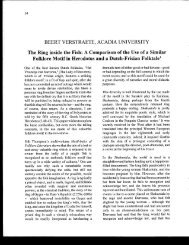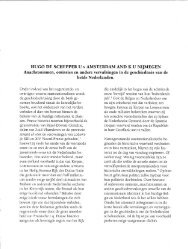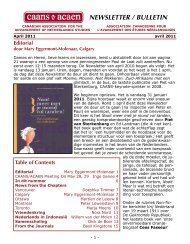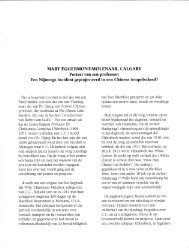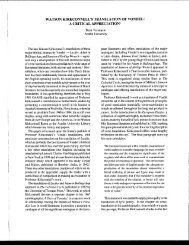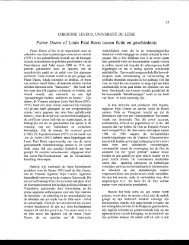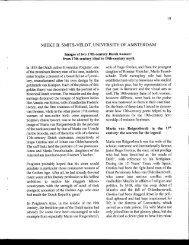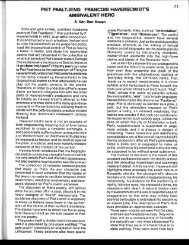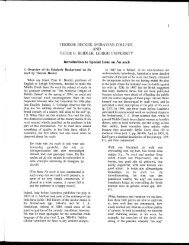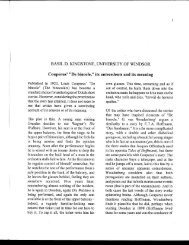Fred J. Nichols - Maria Tesselschade Roemer Visscher (1593-1649)
Fred J. Nichols - Maria Tesselschade Roemer Visscher (1593-1649)
Fred J. Nichols - Maria Tesselschade Roemer Visscher (1593-1649)
Create successful ePaper yourself
Turn your PDF publications into a flip-book with our unique Google optimized e-Paper software.
20 <strong>Fred</strong> <strong>Nichols</strong><br />
artistic inclinations, where Hooft and<br />
Vondel were regular visitors. The two<br />
gifted sisters were not yet married when<br />
their father died in 1620. By this time<br />
<strong>Tesselschade</strong> was being courted by the poet<br />
Bredero, and had already made the<br />
acquaintance of the writer with whom she<br />
had her most complex friendship,<br />
Constantijn Huygens. With her sister Anna,<br />
she seems to have made her first visit to the<br />
Muiderslot in the summer of 1621, where<br />
she quickly became the central ornament.<br />
Though she fascinated the leading literary<br />
figures of her time, she disconcerted all her<br />
admirers by marrying a naval officer, Allard<br />
(Adelaert) Crombalgh, in 1623, and moving<br />
with him to Alkmaar where he lived. To<br />
the puzzlement of observers then and since,<br />
the only remarkable thing about him seems<br />
to have been that he was very handsome.<br />
Her marriage did not, however, end her<br />
involvement with Hoofl's circle. Hooft,<br />
Huygens and Vondel all wrote poems on<br />
her wedding. She kept in touch with her<br />
eminent friends by letter, and she and her<br />
husband were regular visitors at Hooft's<br />
castle, where she continued to be a center of<br />
attention. Every bit of evidence suggests<br />
that the marriage was a happy one, but it<br />
ended abruptly eleven years later when her<br />
husband unexpectedly died just after the<br />
death of their second child. One child had<br />
already died at birth and <strong>Tesselschade</strong> was<br />
left alone with her third daughter, also<br />
named <strong>Maria</strong>. We have the letter she wrote<br />
Hooft about her loss:<br />
You will be able to understand sickness's<br />
nature, death's swiftness, and other<br />
circumstances which I have borne with a<br />
weeping soul, an oppressed heart and a<br />
grieving spirit, but with dry eyes, no other<br />
thought occupying my mind in so sad and<br />
grievous a night, robbed of my soul's sun,<br />
than recalling my beloved, and oh! all too<br />
affectionate Adelaert, who as if on the wings<br />
of love rose to heaven after his Tadea, having<br />
chosen an immortal over a mortal lot, leaving<br />
me behind (alas!) in my depression with the<br />
company of his beloved other half, that in<br />
her, as in a mirror, I may always have his<br />
form with me in my mind's eye, trusting in<br />
that higher will against which there is no<br />
willing?<br />
As a highly eligible widow, she<br />
maintained her attraction for these highly<br />
attentive literary men. Huygens describes<br />
her in a Latin letter to his friend Puteanus,<br />
a professor of rhetoric at Louvain, who had<br />
just met Anna. /He thinks his friend would<br />
have been farimore impressed<br />
/<br />
if you had met her sister <strong>Tesselschade</strong>, a<br />
widow also most able with her hand, but far<br />
more delightful in her beauty, speech and<br />
character, yet with truly distinguished<br />
intellectual abilities .... I think very highly<br />
of her, nor would you be able not to do the<br />
same, if you had only seen one little poem of<br />
those which she engenders every day ....<br />
(Worp 268).<br />
In 1637, a few years after the loss of her<br />
husband and child, she had occasion to<br />
console Huygens on the death of his own<br />
beloved wife, Suzanna van Baerle, the focus<br />
of some of his most intensely felt poems.<br />
This <strong>Tesselschade</strong> did in one of her most<br />
effective poems, a sonnet in which she<br />
urges him to express his grief in the form of<br />
poetry:<br />
Zeght Vastaert, dat hij moght<br />
[pampieren raet vertrouwen<br />
Zoo dinnerlycke smart<br />
[zich schriftlyck uyten kon<br />
Hij staroogh in liefs glans<br />
[als Aedlaer in de Son,<br />
En stel syn leed te boeck,<br />
[zoo heeft hij 't niet t'onthouwen.<br />
Pam pier was 't waepentuijch,<br />
[waermee ick heb geweert<br />
Te willen sterven, eert<br />
[den Heemel had begeert<br />
Daer overwon ick mee<br />
[en deed mijn Vyand wijcken.<br />
(Tell Vastaert that he must entrust himself to<br />
paper's wisdom / This way he could utter<br />
his inner pain in writing. / Let him look into<br />
love's brilliance like an eagle at the sun, /<br />
And record his pain, then he doesn't have to<br />
keep it with him. / Paper was the weapon<br />
which I used to avert / My wish to die<br />
before heaven intended; / With it I



